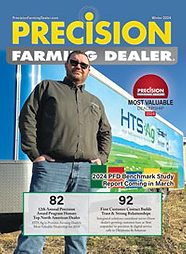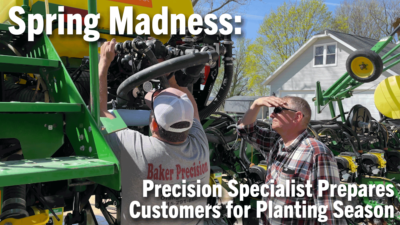Efficient tracking of service hours and product inventory are challenges dealers can face when trying to tailor precision farming solutions for individual customers.
For Seth Conway, precision specialist with Monroe Tractor based in Henrietta, N.Y., these are obstacles to increasing profitability at the 7-store Case IH dealership group. The dealership’s equipment sales team isn’t going to setup technology and technicians can diagnose and troubleshoot problems, Conway says, but neither of the two can take a machine to the field and make it perform at the top end of the spectrum for the customer.
“As business has grown, one of the holes we’ve noticed in our precision farming department is between sales and service, or someone to capture some of that revenue we’re missing out on,” Conway ways. “We’ve had a hard time figuring out exactly where the precision dollars are being spent and returned, because it’s all penciled out through parts, sales and service. It’s not been a diversified part of our precision business.”
Although Monroe has charged for precision service for several years, Conway says they could be more efficient tracking hours and inventory to increase profit. One option the dealership is trying is a product specialist, or a liaison between sales and service, who is also responsible for setups and demonstrations of new technology for customers.
Seth Conway, precision farming specialist with Monroe Tractor in Henrietta, N.Y., shares the dealership's approach to bridging the gap between precision farming service and sales with a "product specialist" to better manage precision inventory and tailor technology solutions to fit each farm customer.
The product specialist works with sales to make sure the staff knows what they’re selling before they quote anything and then see it to the end, put it in the field and make it run,” Conway says. “If the equipment is supposed to plant singulated corn or evaluate plant health, we’re going to guarantee that with this person or group as part of our precision farming operation.”
This “hybrid” specialist will also coordinate equipment demonstrations and accompany salespeople on customer visits to tailor technology solutions to meet individual farmer needs. The objective, Conway says, is to make sure customers are buying systems that will give them the best return on investment.
“We sell several precision brands and understand that farmers develop a preference for particular systems,” he says. “It’s far better for us to sell a customer what they want, rather than something they don’t want, because it keeps them coming back.”
Another goal of having a product specialist is to better manage precision inventory. While more new farm equipment is coming from the factory equipped with technology, Conway still doesn’t want to be stuck with excess inventory of pricey precision systems. Having someone who can identify the right product for the customer before it’s sold, and know what’s in stock, keeps equipment moving instead sitting on the shelf.
“If a precision system is an option on the wholegoods side, then we’re going to leave it off and fill from stock,” Conway says. “Whether that’s right or wrong, I don’t know. But I can manage my inventory better and the customer sees us as a partner, because we’re working with them on the best solution.
“Plus, it allows us to keep products moving. Having a $10,000 kit sitting on the shelf for 2 years doesn’t do us any good. If we can offer made-to-order systems for customers, that is profitable for us and gives them what they want.”






Post a comment
Report Abusive Comment